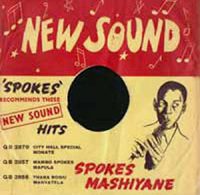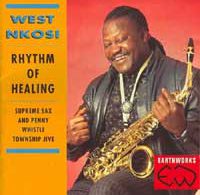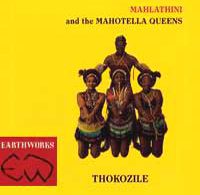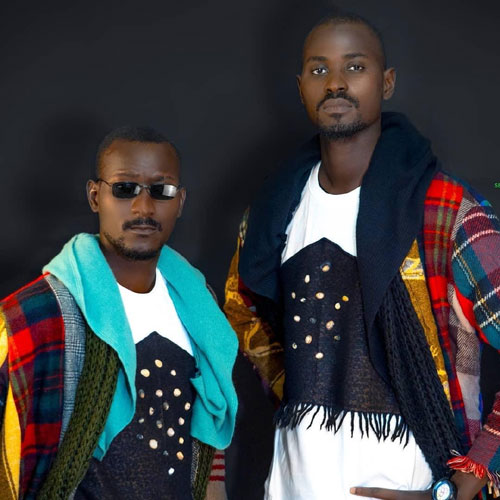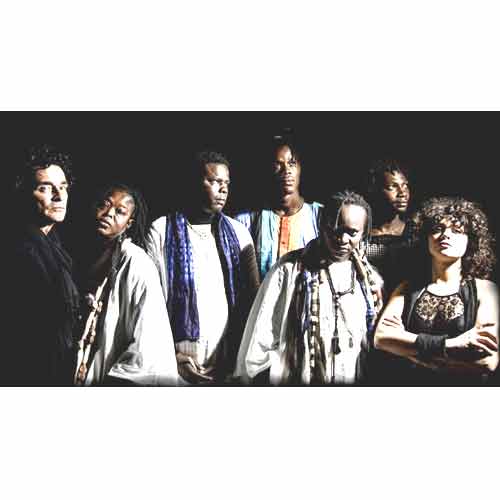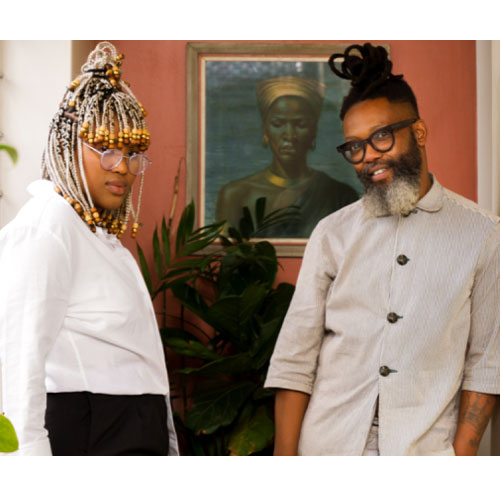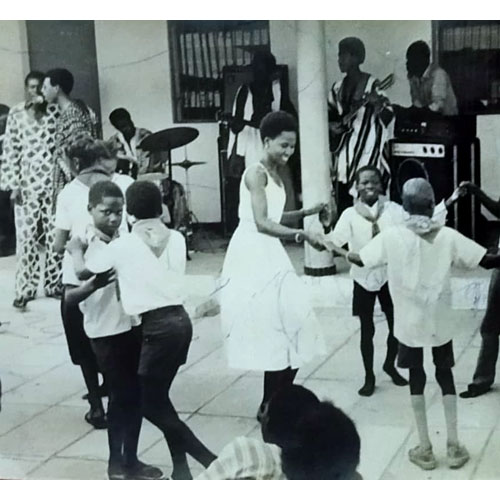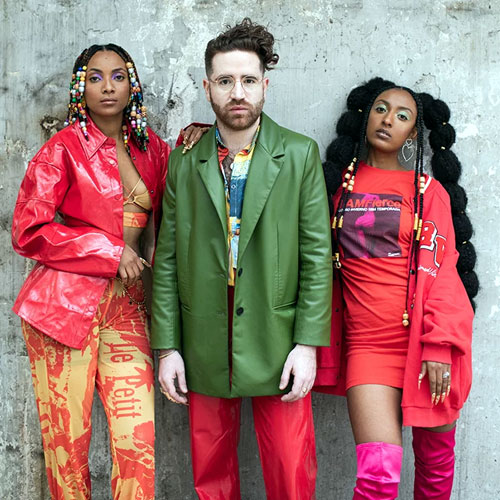West Nkosi & The Pretoria Tower Boys
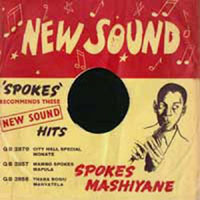
Spokes Mashiyane
Rupert Bopape et Mavuthela
En 1962, West Nkosi, Monama et Makwela s’installent à Johannesburg et jouent au sein du Hollywood Jazz Band. West Nkosi assure le saxophone, Monama, la batterie et Makwela, la basse. En 1964, Rupert Bopape, responsable du label Mavuthela, le département des musiques noires de la maison Gallo, monte Makgona Tsohle Band; un groupe formé des trois complices, de Vivian Ngubane à la guitare rythmique et de Marks Mankwane à la guitare électrique.
Le mbaqanga
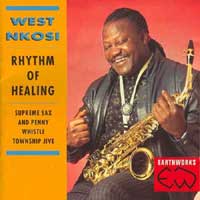 Le Makgona Tsohle Band (ou Makhona Tsohle Band) électrifie bientôt un nouveau style qui fusionne kwela, marabi et des sonorités traditionnelles zulu, xhosa et sotho : le mbaqanga. Le groupe signe un premier album à son nom, Let’s Move with the Makhona Tsohle Band. Le genre obtient une reconnaissance officielle à l’occasion du Castle Jazz festival à l’Orlando Stadium de Soweto. Pour renforcer la formation, Rupert Bopape recrute Simon Mahlathini Nkabinde, le “groaner”, et un groupe vocal féminin qui prendra plusieurs noms (Izintombi Zomgqashiyo, Dima Sisters, Mahotella Queens ou les Mgqashiyo Girls) : “mgqashiyo” (“balancer” en zulu) fait référence à cette combinaison de mbaqanga, de voix féminines et de danse très toniques qu’elles exécutent sur scène. Le groupe connaît un succès immédiat. Le groupe prend bientôt le nom de Mahlathini & The Mahotella Queens et connaît un succès sans précédent jusqu’au milieu des années 1970. En 1977, Rupert Bopape, victime d’une crise cardiaque se retire et Marks Mankwane, West Nkosi et Lucky Monama, deviennent producteurs chez Gallo: le Makgona Tsohle Band s’arrête d’autant que le succès des Mahotella Queens s’étiole avec la popularité grandissante de la de la soul et de la bubblegum music (disco–pop) qui éclipsent le mbaqanga.
Le Makgona Tsohle Band (ou Makhona Tsohle Band) électrifie bientôt un nouveau style qui fusionne kwela, marabi et des sonorités traditionnelles zulu, xhosa et sotho : le mbaqanga. Le groupe signe un premier album à son nom, Let’s Move with the Makhona Tsohle Band. Le genre obtient une reconnaissance officielle à l’occasion du Castle Jazz festival à l’Orlando Stadium de Soweto. Pour renforcer la formation, Rupert Bopape recrute Simon Mahlathini Nkabinde, le “groaner”, et un groupe vocal féminin qui prendra plusieurs noms (Izintombi Zomgqashiyo, Dima Sisters, Mahotella Queens ou les Mgqashiyo Girls) : “mgqashiyo” (“balancer” en zulu) fait référence à cette combinaison de mbaqanga, de voix féminines et de danse très toniques qu’elles exécutent sur scène. Le groupe connaît un succès immédiat. Le groupe prend bientôt le nom de Mahlathini & The Mahotella Queens et connaît un succès sans précédent jusqu’au milieu des années 1970. En 1977, Rupert Bopape, victime d’une crise cardiaque se retire et Marks Mankwane, West Nkosi et Lucky Monama, deviennent producteurs chez Gallo: le Makgona Tsohle Band s’arrête d’autant que le succès des Mahotella Queens s’étiole avec la popularité grandissante de la de la soul et de la bubblegum music (disco–pop) qui éclipsent le mbaqanga.
Succès international
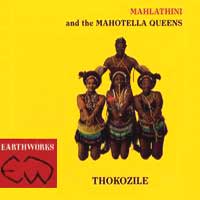 En 1982, West Nkosi lance sur la chaîne de télévision SABC3, “Mathaka”, une comédie musicale racontant la vie d’un garage, et recrute le Makgona Tsohle Band pour la musique de la série. Il enregistre à cette occasion deux 33 tours, Mathaka Vol1 et Mathaka vol2. Le show s’arrête en 1984 et West Nkosi remonte Mahotella Queens et signe un album à succès Amaqhawe Omgqashiyo. En 1986, la tournée Graceland de Paul Simon lance la musique sud-africaine sur la scène internationale : Mahlathini & The Mahotella Queens sortent l’année suivante Thokozile, un premier succès mondial. Jusqu’en 1997, le groupe accumule les hits dont le fameux “Kazet” et tourne dans le monde entier. Mais en 1998, West Nkosi et Marks Mankwane disparaissent, suivis l’année suivante de Simon Mahlathini. C’est la fin du Makgona Tsohle Band. Mahotella Queens, quant à elles, poursuivent leur carrière internationale, accompagnées par de nouveaux musiciens.
En 1982, West Nkosi lance sur la chaîne de télévision SABC3, “Mathaka”, une comédie musicale racontant la vie d’un garage, et recrute le Makgona Tsohle Band pour la musique de la série. Il enregistre à cette occasion deux 33 tours, Mathaka Vol1 et Mathaka vol2. Le show s’arrête en 1984 et West Nkosi remonte Mahotella Queens et signe un album à succès Amaqhawe Omgqashiyo. En 1986, la tournée Graceland de Paul Simon lance la musique sud-africaine sur la scène internationale : Mahlathini & The Mahotella Queens sortent l’année suivante Thokozile, un premier succès mondial. Jusqu’en 1997, le groupe accumule les hits dont le fameux “Kazet” et tourne dans le monde entier. Mais en 1998, West Nkosi et Marks Mankwane disparaissent, suivis l’année suivante de Simon Mahlathini. C’est la fin du Makgona Tsohle Band. Mahotella Queens, quant à elles, poursuivent leur carrière internationale, accompagnées par de nouveaux musiciens.
Sources :
Wikipedia
livret de Rob Allingham dans l’album Mathaka Vol1. Gallo, Nov 2007.
Itw de West NKosi par Sylvie Clerfeuille, Johannesburg, 1997. The Pretoria Tower Boys
Formed in 1964 by Rupert Bopape, producer at Mavuthela, the Black Music label of Gallo Record Company, this session group gathered West Nkosi (sax alto), Lucky Monoma (penny whistle, flute), Marks Mankwane (drums), Joseph Makwela (lead guitar) and Vivian Ngubane (bass and rythmic guitar) replaced later by Sipho Madondo. Most of these musicians were originally domestic workers in Pretoria. The name Makgona Tsohle means “Jack-of-all-trades”. The first band, The Pretoria Tower Boys, was formed in 1957 by West Nkosi who played pennywhistle, inspired by Spokes Mashiyane, the king of Kwela, Lucky Momana (pennywhistle) and Joseph Makwela (guitar).
Mbaqanga and Mgqashiyo
The three musicians settled in Johanensburg in 1962 and joined the Hollywood Jazz Band (Nkosi was playing sax and Monama, drums). In 1964, Rupert Bopape, in charge of Mavuthela, recruited them as well as Vivian Ngubane (rhythm guitar) and Marks Mankwane (electric guitar). Together they experimented a new style merging zulu, sotho and xhosa traditional music, marabi and kwela with an electric instrumentation. Rupert Bopape decided to add singers, a bass voice (Simon Mahlathini the “groaner”) and a female line up (the Mahotella Queens also named Izintombi Zomgqashiyo, The Dima Sisters, or the Mgqashiyo Girls, the word mgqashiyo (bounce in zulu) refering to their bouncing style. Mahlathini and the Mahotella Queens, backed by the Makgona Tsohle, toured all over Southern Africa until the mid-seventies. In 1977, Rupert Bopape had a heart attack and decided to retire. West Nkosi, Marks Mankwane and Lucky Monama became full time producers for Mavuthela and the Makgona Tsohle Band stopped. Mbaqanga was eclipsed by disco and soul music and the Mahotella Queens’ career was declining.
World fame
In 1982, West Nkosi launched on SABC3 TV channel, a musical comedy, Mathaka and reformed the Makgona Tsohle Band. He released two albums during this period, Mathaka vol1. and Botoko vol2. When the series stopped in 1984, he reformed the Mahotella Queens and recorded a successful album, Amaqhawe Omgqashiyo. In 1986, Paul Simon and his Graceland tour made south african music popular all over the world. The next year, Mahlathini and the Mahotella Queens made famous worldwide with Thokozile andf their success never stopped since then. The Makgona Tsohle Band backed the group until 1997.
The end
The next year, West Nkosi died in a car accident and Marks Mankwane died the very day of West Nkosi’s funerals. The next year, Simon Mahlathini also died. The Makhona Tsohle Band disbanded. Several months after Simon Mahlathini’s death, The Mahotella Queens reformed and carried on touring wolrwide successfully, backed by new musicians.
source :
Wikipedia
itw West NKosi by Sylvie Clerfeuille, Johannesburg, 1997.

